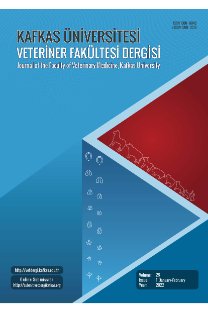Parvoviral hemorajik gastroenteritisli köpeklerin sağıltımında total parenteral beslemenin etkisi
gastroenteritis, Parvovirus, kan gazları, köpek parvovirüsü, klinik görünüm, köpek, ölüm oranı, parenteral besleme, biyokimyasal parametreler
Effects of total parenteral nutrition in the treatment of dogs with parvoviral hemorrhagic gastroenteritis
gastroenteritis, Parvovirus, blood gases, canine parvovirus, clinical aspects, dogs, mortality, parenteral feeding, biochemical parameters,
___
- 1. Else RW: Fatal haemorrhagic enteritis in a puppy associted with parvovirus infection. Vet Rec,106, 14-15, 1979.
- 2. Macartney L, McCandlish IAP, Thompson H, Cornwell HJC: Canine parvovirus enteritis 1: Clinical, haematological and pathological features of experimental infection. Vet Rec, 115, 201-210, 1984.
- 3. HoskKns JD: Update on canine parvoviral enteritis. Vet Med, 694-709, 1997.
- 4. Eugster AK, Bendele RA, Jones LP: Parvoviral infection in dogs. JAVMA, 173, 1340-1341, 1978.
- 5. Mulvey JJ, NKelsen SB, Haskins ME, Jezyk PF: Myocarditis ınduced by parvoviral infection in weanling pups in the United States. JAVMA, 77, 695-698, 1980.
- 6. Ünsüren H, Emre Z, Kurtdede A: Köpek parvoviral enteritislerinde sağıtım ve hematolojik bulgular üzerine araştırmalar. Ankara Üniv Vet Fak Derg, 30, 328-336, 1983.
- 7. Pollock RVH, Coyne MJ: Canine parvovirus. Vet Clin North Am: Small Anim Pract, 23, 555-568, 1993.
- 8. Sherding RG: Diseases of The Small Bowel. In, Ettinger SJ, Feldman EC (Eds): Textbook of Veterinary Internal Medicine, p.1351-1353, W.B. Saunders Company, Philadelphia. 1989.
- 9. Heald RD, Jones BD, Schmidt DA: Blood gas and electrolyte concentrations in canine parvoviral enteritis. J Am Hosp Assoc, 22, 745-748, 1986.
- 10. Turgut K, Ok M: Köpek ve kedilerde diyare ile karekterize hastalıklar. In, Veteriner Gastroenteroloji, Semptomdan Teşhise. s.125-194, Bahç]vanlar Bas]m San. A.Ş. Konya. 1997.
- 11. Abood S, Dunn T, Hoskins J, Polley D, Willard M: Clinical management of canine parvovirus, Part 3. Canine Pract, 21, 20-26, 1996.
- 12. Kuffer M, Hartmann K, Kraft W: Canine Parvovirose: Aspekte zu Epidemiologie, Klinik, Laborbefunden, Therapie und Impfung. Tierärztl Prax, 25, 518-524, 1997.
- 13. Remillard RL, Thatcher CD: Parenteral nutrition support in the small animal patient. Vet Clin North Am: Small Anim Pract, 19, 1287-1307, 1989.
- 14. Simpson JW, Anderson RS, Markwell PJ: Anorexia, enteral and parenteral feeding. In, Clinical Nutrition of the Dog and Cat. p. 96-114, Blackwell Scientific Publications, Oxford. 1994.
- 15. Carter JM, Freedman AB: Total intravenous feeding in the dog. JAVMA, 171, 71-76, 1977.
- 16. Dirksen G: Kälberruhr in Never. Sicht Prakt Tierärzt, 59, (Coll Vet), 42-45, 1978.
- 17. Cullen LK: Principles of fluid and electrolyte therapy in small animals. Aust Vet Pract, 21, 24-37, 1991.
- 18. Düzgüneş O, Keseci T, Gürbüz F: İstatistik Metotları I, Ders Kitabı. Ankara Üniv Ziraat Fak. Yayınları, 861, Ankara Üniv Basımevi, Ankara. 1983.
- 19. Dimmitt R: Clinical experience with cross-protective antiendotoxin antiserum in dogs with parvoviral enteritis. Canine Pract, 16, 23-26, 1991.
- 20. Dalton MJ, Schepers G, Gee JP: Consultative total parenteral nutrition teams: The effect of the incidence of total parenteral nutrition - related comlications. J Parenter Nutr, 8, 146-152, 1984.
- 21. Mason MJ, Gillett NA, Muggenburg BA: Clinical, pathological, and epidemiological aspects of canine parvoviral enteritis in an unvaccinated closed beagle colony. 1978-1985. JAAHA, 23, 183-192, 1987.
- 22. Appel MJG: Isolation and immunization studies of a canine parvo-like virus from dogs with haemorrhagic enteritis. Vet Rec, 105, 156, 1979.
- 23. Chandrar K, Scrimshaw NS: Immunocompetence in nutritional assessment. Am J Clin Nutr, 33, 2694-2697, 1980.
- 24. Abraham E: Immunoligic mechanisms underlying sepsis in the critically ill surgical patient. Surg Clin North Am, 65, 995-1003, 1985.
- 25. Buzby GP, Mullen JL, Stein TP: Manipulation of TPN caloric substrate and fatty infiltration of the liver. J Surg Res, 31, 46-54, 1981.
- 26. Hill RC: Critical Care Nutrition. In, Wills JM, Simpson KW (Eds): The Waltham Book of Clinical Nutrition of the Dog and Cat. p.39-61, Waltham Centre For Pet Nutrition, A Division of Mars GB Ltd. 1994.
- 27. Lewis LD, Morris ML, Hand MS: Anorexia, Inanition and Critical Care Nutrition. In, Small Animal Clinical Nutrition III. 5-2 - 5-43. Mark Morris Associates, Topeka, Kansas, 1987.
- 28. Hänies, von R, Mischke R, Wirth W: Plasmatransfusion beim Hund: Wirkung bei Hypoproteinemie infolge hemorrhagischer Gastroenteritis. Tierärzt Umschau, 51, 350- 356, 1996.
- 29. Michell AR, Bywater RJ, Clarke KW: Metabolic and endocrine disturbances; parenteral nutrition. In, Veterinary Fluid Therapy. p. 222-245, Blackwell Scientific Publications, Oxford. 1989.
- 30. Lippert AC, Buffington, CAT: Parenteral nutrition. In, Dibartola SP (Ed): Fluid Therapy in Small Animal Practice, W.B. Saunders, Philadelphia. 384-418, 1992.
- 31. Meguid MM, Akahoshi MP, Jeffers S: Amelioration of metabolic complications of conventional total parenteral nutrition: A prospective randomized study. Arch Surg,119, 1294-1298, 1984.
- 32. Askanazi J, Mathews D, Rothkopf M: Patterns of fuel utilization during parenteral nutrition. Surg Clin North Am, 66, 1091-1103, 1986.
- 33. Jacobs MR: Clinicopathologic features of canine parvoviral enteritis. JAAHA, 16, 809, 1980.
- ISSN: 1300-6045
- Yayın Aralığı: Yılda 6 Sayı
- Başlangıç: 1995
- Yayıncı: Kafkas Üniv. Veteriner Fak.
A study on determining the opinion of veterinarians on continuing education
Şule OSMANAĞAOĞLU, Melek KALKAN, AYŞE MENTEŞ GÜRLER, M. Emin SARDOĞAN
Detailed characteristics of the migrating motor complex in Man and Animals
Coagulation parameters in cattle with left displacement of abomasum
MEHMET ÇAĞRI KARAKURUM, METİN KORAY ALBAY, ŞİMA ŞAHİNDURAN, KENAN SEZER
Typing of verotoxigenic Escherichia coli strains isolated from animal and human sources
TİMUR GÜLHAN, BANUR BOYNUKARA, MUSTAFA ALİŞARLI
Effects of Coenzyme Q10 on blood biochemistry in rats
DİLEK KESKİN, OKAN ATAY, ŞÜKRÜ KIRKAN, ÖZDAL GÖKDAL, Serten TEKBIYIK, Osman KAYA, VADULLAH EREN
A cutaneous myxoma case in A 12-year-old boxer
DİLEK OLĞUN ERDİKMEN, Haris HAŞİMBEGOVİÇ, GÜLBİN ŞENNAZLI, KIVILCIM SÖNMEZ
ALİ HAYDAR KIRMIZIGÜL, Erhan GÖKÇE, ZAFER ÖZYILDIZ, FATİH BÜYÜK, MİTAT ŞAHİN
